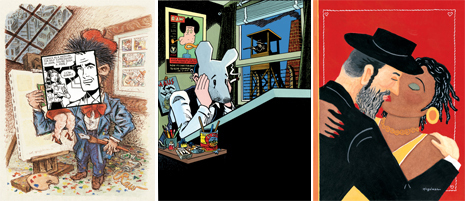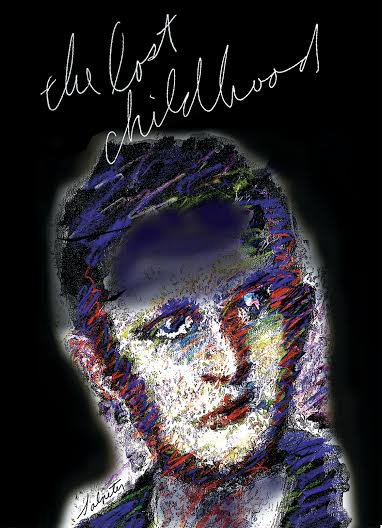Puffing vigorously on a cigarette substitute, Art Spiegelman addressed journalists at the Jewish Museum at a recent opening of an exhibition "Co-mix: A Retrospective of Comics, Graphics and Scraps." Referring to his most potent inspiration for subversive art, "Mad Magazine," he jokes, he's convinced, the Viet Nam War protests would not have happened had it not been for the influence of this satirical comic magazine on Spiegelman's generation. What, me worry? Alfred E. Neuman's laugh line teased young readers to check between the words and pictures for hidden truth. The sumptuous retrospective of Spiegelman's career at the Jewish Museum, including his work in underground Raw, to book covers as in his Paul Auster New York Trilogy art, to the highbrow and controversial The New Yorker covers, illustrates a much wider range, but he is best known for his Pulitzer Prize winning Maus, based on his relationship with his father Vladek, a Holocaust survivor. Whatever else the artist has done, including an upcoming collaboration with Phillip Johnston, "Wordless!" at Brooklyn Academy of Music, his work is overwhelmed by Maus: "Holocaust trumps Art," he laughs in mock ruefulness.
Spiegelman's quip may inform another recent event. Based on the memoir by Yehuda Nir, a fully orchestrated concert of the opera Lost Childhood had a premiere at the Strathmore Music Center in Bethesda, Maryland last week, in commemoration of Kristallnacht. Commissioned and nurtured by American Opera Projects based in New York, the opera illustrates the stages of the dehumanization of Jewish life through the war journey of the Gruenfeld family. Father was murdered right away, leaving young Julek, his sister Lala, and Mother, to make their way through a series of tragicomic scenes in order to survive. Composer Janice Hamer and librettist Mary Azrael added to the scenes of the past, a dialogue in post-Holocaust times of a grown up Julek, Judah Gruenfeld and Manfred Geier, a fictional character based on Gottfried Wagner, great grandson of the composer Richard Wagner. Trying to make sense of the Holocaust's most enduring paradoxes, the men agree to listen and continue their dialogue. While some viewers questioned the inclusion of a German who is looking to end his guilty nightmares, the men's conversation about the horrors of the past in civilized Europe may provide a path to move this history--and opera-- forward.
A version of this post also appears on Gossip Central.


